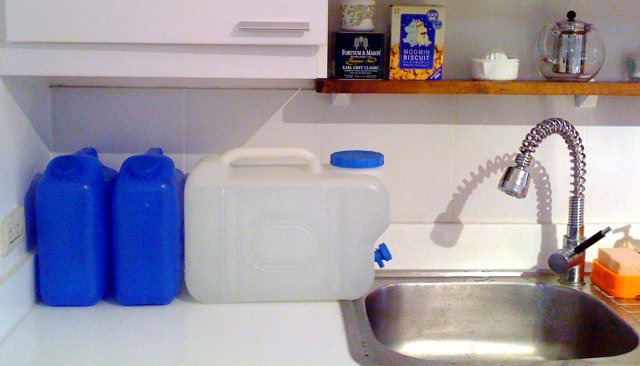Water is always at the top of any disaster preparedness list as it’s essential for survival. The generally accepted guideline is to set side 4 liters (1 gallon) of water per person, per day, for drinking and sanitation. Keep in mind that in a tropical country like the Philippines, even the slightest physical exertion is going to leave you dripping with perspiration, thereby causing your body to lose valuable water reserves.
While water storage options are readily available, the biggest problem is that they tend to be bulky and need cycling to prevent a build up of harmful bacteria. This can be especially problematic in condo units where space is a premium. Being a condo dweller in Metro Manila with a wife and water-intensive baby, I know first-hand how difficult this can be.
The solution I’ve found is to keep water caches in locations where they have practical every-day use. For example, a plastic jerry can with tap kept by the kitchen sink acts as water storage. Once in a while, we use it for washing dishes before topping up the jerry can with fresh tap water.

The clear plastic jerry can in the picture above holds 20 liters, which is enough to last one person for around 5 days. The blue plastic jerry cans hold just over 6 liters each. These can be purchased from hardware stores like Ace Hardware and True Value. (The 20 liter can was approximately Php300 and the blue 6 liter cans are Php49.)
We also keep additional jerry cans in a cupboard and bottled mineral water in the fridge and pantry, as well as a balde (water bucket) in the shower. In total, I estimate that my wife, baby and I can go almost two weeks just using the stored water in our one-bedroom condo unit.
Note: be sure to store as much of your water as possible at floor level. If stored high up, such as on shelving, movement during an earthquake could cause them to fall. This not only risks injuring someone but also means you lose some of your water reserves.

What I do is refill those Absolut or Wilkins gallon water bottles used for the kids milk formula.
The most expensive part of buying water is the container, so refilling them saves you money and you have a ready supply. Ive stored some bottles for a year with no problems. Mark them so you use the older bottles first.
Did you treat the water before storage to make them last for a year? Or did you just keep them in the dark?
i just kept the bottles as is as i got them from the refilling station. Stored them in a corner or behind the door or even as a doorstop. Ive drunk “expired” water before and what the heck, water never expires! Just purify and its GTG again.
What about bacterias in the water? When u store water the bacterias multiply so its good to treat it before drinking it.
It depends on the water source. From my research, it seems that commercially bottled water can store for a year or more if it’s kept unopened. Like nimrod60c, I’ve also drunk ‘old’ bottled water and apart from a stale taste, it was fine. If you fill it yourself, you have to consider cleanliness of the source and storage container and it might be wise to treat it before drinking.
There are lots of ways to treat water before drinking. Here’s a summary of a few:
Remember this is water from a refilling station, not tap water so there is much less bacterial count hence storage is longer without any problems. I stuck with one water refilling station that has given consistent service, knowing their filtration and purification systems are always maintained. Oh, and I tip the guy who picks up our water so he makes sure its up to spec
Consider using waterbeds for water storage. There are survivalist stores in the U.S. (unfortunately there are none in Manila) that offer water beds that are designed for Preppers.
Water beds makes sense as water containers since although they are there – they are unobtrusive – they take up as much space as a regular bed (for comparison imagine having 110 liter barrels in your bedroom). Just make sure your structure can carry the weight of a water bed. A rule of thumb to remember is that 1 liter of water weighs 1 kilogram.
SAFETY: Consider the possibility of a leak in your water bed – where will the water go? What will get damaged?
Other than that you will be chugging away long after your taps have gone dry.